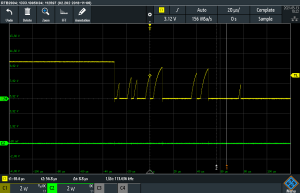Gawk provides built-in networking support. The gawk manual has some examples, for basic UDP-communication at [1]. The classical sender/receiver code snippets are as follows:
# Server
BEGIN {
print strftime() |& "/inet/udp/8888/0/0"
close("/inet/udp/8888/0/0")
}
# Client
BEGIN {
"/inet/udp/0/localhost/8888" |& getline
print $0
close("/inet/udp/0/localhost/8888")
}
Unfortunately these examples did not work on my test system under Ubuntu 13.10 Desktop 64bit and gawk v. xxxxx. Ref. [2] provided the correct description of the fields of the network strings. Using that, my working versions are:
#! /usr/bin/gawk -f
BEGIN {
print strftime() |& "/inet/udp/0/localhost/8888"
close("/inet/udp/0/localhost/8888")
}
and
#! /usr/bin/gawk -f
BEGIN {
"/inet/udp/8888/0/0" |& getline
print $0
close("/inet/udp/8888/0/0")
}
According to [2], the full syntax of the special file name is:
/net-type/protocol/local-port/remote-host/remote-port
Replace “localhost” with the IP address of a remote machine, if receiver and server are not running on the same machine.
[1] http://www.gnu.org/software/gawk/manual/gawkinet/html_node/File-_002finet_002fudp.html#File-_002finet_002fudp
[2] https://www.gnu.org/software/gawk/manual/html_node/TCP_002fIP-Networking.html
